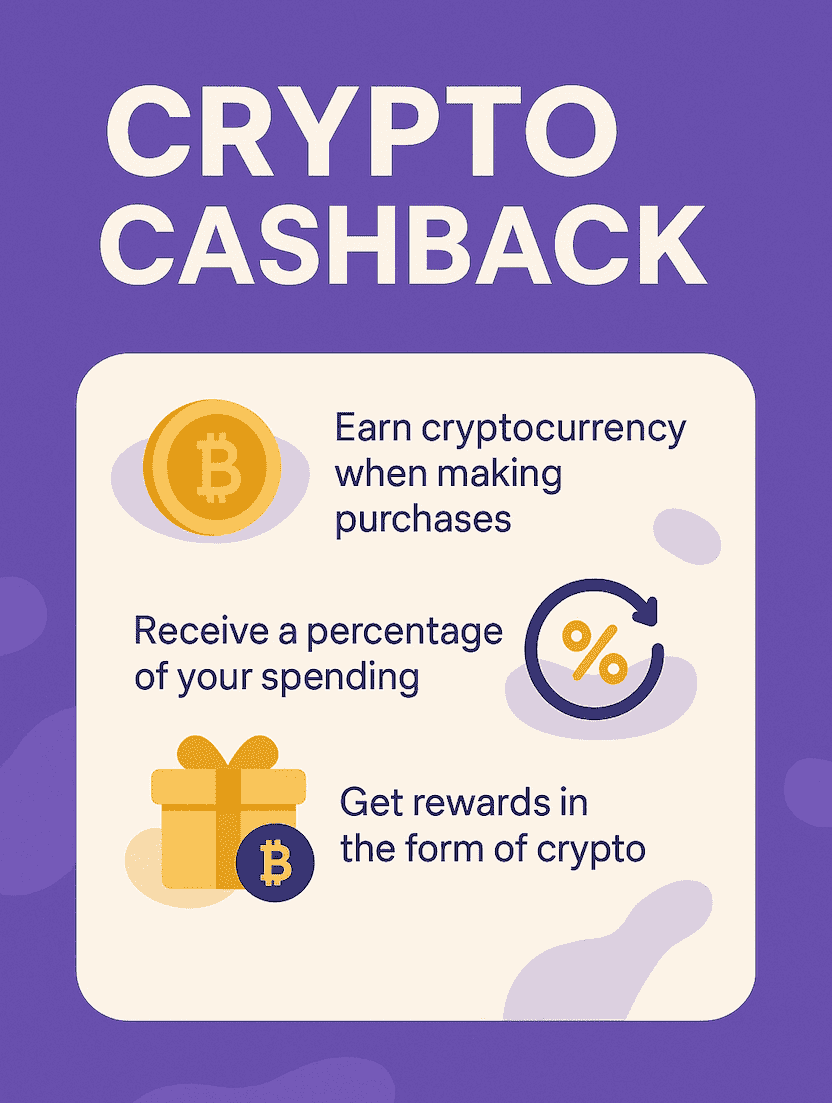Advertiser Disclosure
Last update: September 19, 2025
6 minutes read
What is Crypto Cashback? How Students Earn Bitcoin on Every Purchase
Ever wondered if you could earn Bitcoin while buying textbooks? Discover how crypto cashback cards help students build digital wealth with everyday purchases.

By Derick Rodriguez, Associate Editor
Edited by Yerain Abreu, M.S.
Learn more about our editorial standards



By Derick Rodriguez, Associate Editor
Edited by Yerain Abreu, M.S.
Learn more about our editorial standards
What if every coffee run, textbook purchase, or grocery trip could help you build a cryptocurrency portfolio? That's exactly what crypto cashback does. Instead of earning traditional cash rewards or points, these innovative payment cards give you Bitcoin or other digital currencies every time you swipe.
For students already stretched thin financially, crypto cashback offers a unique opportunity to dip your toes into the digital currency world without any additional investment. You're spending money anyway, so why not get rewarded with an asset that could potentially grow over time?

Key takeaways
- Crypto cashback cards reward you with Bitcoin or other cryptocurrencies instead of traditional cash rewards
- Students can earn 0.5-4% back in crypto on purchases they're already making
- Most crypto rewards are automatically deposited into a digital wallet managed by the card company
Crypto cashback explained: earning Bitcoin instead of dollars
Crypto cashback works just like traditional cashback, but instead of receiving dollars back, you earn cryptocurrency. When you make a purchase with a crypto cashback card, a percentage of your spending gets converted into Bitcoin, Ethereum, or whatever digital currency the card offers.
Most crypto cashback programs offer between 0.5% to 4% back on purchases. The exact rate often depends on your spending category, account tier, and whether you hold the platform's native cryptocurrency.
For example, you might earn 2% back in Bitcoin on dining purchases or 1% on everything else. The crypto rewards typically get deposited directly into a digital wallet that the card company manages for you.
Some platforms let you convert between different cryptocurrencies or cash out your rewards, while others require you to hold the crypto for a certain period.

TuitionHero Tip
Start small with crypto cashback if you're new to cryptocurrency. You can always increase your usage once you're comfortable with how digital wallets work.

How students can start earning crypto rewards today
Getting started with crypto cashback as a student is surprisingly straightforward:
- Apply for the card just like any other credit or debit card, though some companies have minimum age or income requirements.
- Use the card for regular student expenses like dining hall meals, textbooks, streaming subscriptions, or weekend activities.
- Cashback is automatically converted into cryptocurrency at current market rates.
- Your crypto rewards accumulate in the app or online portal, often with real-time value updates.
Some cards require you to stake their native cryptocurrency for higher reward rates, though basic rewards are usually available without upfront investment.

TuitionHero Tip
Look for student-friendly crypto cards that don't require minimum staking amounts or have lower income requirements.
Best crypto cashback cards for college budgets (Updated September 2025)
Currently available options:
- Gemini Credit Card: Offers up to 4% back in Bitcoin or XRP on dining purchases and 1% on everything else. There's no annual fee and you can redeem rewards immediately. Recently launched an XRP edition with enhanced rewards.
- Crypto.com Visa Card: Has multiple tiers, with the basic level offering 1% back in their native CRO cryptocurrency. Higher tiers require staking CRO tokens but offer better rewards and perks like Spotify reimbursements.
- Coinbase Card: Offers varying rates depending on the cryptocurrency chosen, typically 1-4% back. You need a Coinbase account to use the card. Note that this card may have conversion fees that reduce effective rewards.
Each remaining card has different approval requirements, reward structures, and features. Students should compare current options based on their spending habits and comfort level with cryptocurrency.
Compare private student loans now
TuitionHero simplifies your student loan decision, with multiple top loans side-by-side.
Compare Rates
Are crypto rewards worth it for students?
- Potential for growth: Unlike cash rewards that stay static, crypto rewards could increase in value over time
- Learning opportunity: Helps students gain hands-on experience with digital currencies
- No extra spending required: You earn crypto on purchases you're already making
- Easy diversification: Some cards let you earn different types of cryptocurrency
- Market volatility: Your rewards can lose value just as easily as they can gain
- Tax complexity: Crypto rewards are taxable events that require careful record-keeping
- Limited spending power: You can't always spend crypto rewards directly like traditional cashback
- Platform dependency: Your crypto is typically held by the card company, not in your own wallet
- Company risk: As seen with BlockFi's bankruptcy, crypto companies can fail, potentially affecting access to your rewards
Students need to weigh these factors based on their financial situation and risk tolerance. If you're living paycheck to paycheck, traditional cashback might serve you better than volatile crypto rewards.
Crypto cashback taxes: What students need to know
Here's where crypto cashback gets tricky: the IRS considers cryptocurrency rewards taxable income at their fair market value when you receive them.
This means if you earn $50 worth of Bitcoin in rewards during the year, you owe taxes on that $50 as ordinary income.
You also create a taxable event when you sell, spend, or convert your crypto rewards. If the Bitcoin you earned as rewards increases in value and you later sell it, you'll owe capital gains tax on the profit.
Record-keeping requirements:
- Track the dollar value of crypto rewards when earned
- Note the date and market price for each reward deposit
- Document any sales or conversions of your crypto
- Save all tax documents provided by the card company
Many crypto cashback platforms provide tax reporting tools or partner with crypto tax software companies to help users manage their tax obligations.

TuitionHero Tip
Consider consulting with a tax professional if you're earning significant crypto rewards, especially if you're also receiving financial aid that could be affected by additional income.
How to maximize your crypto rewards as a student
Once you've chosen a crypto cashback card, a few simple strategies can help you earn more digital currency without changing your spending habits. The goal isn't to spend more money, but to be smarter about where and how you use your card.
- Start with everyday expenses: Focus crypto cashback on purchases you'd make anyway, like groceries, gas, or subscription services. This ensures you're not overspending just to earn rewards.
- Dollar-cost average naturally: Since you're earning crypto regularly through spending, you'll automatically buy at different price points. This can help smooth out market volatility over time.
- Understand your card's categories: Some cards offer higher rates for specific spending types. If your card gives extra crypto for dining, use it for food purchases, but switch to a different card for other expenses.
- Monitor reward caps: Check if your card limits how much crypto you can earn per month or year. Once you hit the cap, you might want to switch to a different rewards card.
- Consider your timeline: If you're planning to cash out crypto rewards quickly, market volatility matters more. If you're comfortable holding for years, short-term price swings are less concerning.
When you'll owe taxes on crypto rewards
Event | Tax Treatment | When It Happens |
|---|---|---|
Earning crypto rewards | Ordinary income at fair market value | When rewards are deposited |
Selling crypto for cash | Capital gains on any price increase | When you sell or convert |
Using crypto to buy things | Capital gains on any price increase | When you spend crypto |

Why trust TuitionHero
At TuitionHero, we help you find the best private student loans by comparing top lenders and breaking down eligibility, interest rates, and repayment options. Whether you need additional funding beyond federal aid or a loan without a cosigner, we simplify the process. We also provide expert insights on refinancing, FAFSA assistance, scholarships, and student credit cards to support your financial success.
Frequently asked questions (FAQ)
Not really. The cards work like regular payment cards, and most platforms handle the technical aspects for you. However, understanding basics like market volatility and tax implications will help you use them more effectively.
This depends on how the company structures its custody. Some platforms hold crypto in accounts that are separate from company assets, while others don't offer the same protections as FDIC-insured bank accounts.
The BlockFi bankruptcy in 2022 highlighted this risk: Customers lost access to their rewards when the company failed. Read the terms carefully and consider transferring large balances to your own wallet.
Many platforms allow you to sell crypto rewards for cash, though this creates a taxable event. Some cards also offer the option to earn traditional cashback instead of crypto.
Most cards have annual or monthly limits on how much crypto you can earn. These caps vary by provider and account tier, so check the details before choosing a card.
Most platforms deposit crypto rewards within a few business days of your purchase. The exact timing depends on the card provider and current network conditions for the cryptocurrency being awarded.
Final thoughts
Crypto cashback offers students a low-risk entry into digital currencies. Build a crypto portfolio through everyday spending while learning market dynamics. Be aware of market volatility, tax complexities, and platform risks, as seen with companies like BlockFi.
If you're financially organized and risk-tolerant, crypto cashback can supplement your student budget, but it's not a get-rich-quick scheme. Always verify card availability and company stability.
The crypto card market changes rapidly. Always verify current card availability, terms, and company status directly with providers before applying, as information can become outdated quickly.
Source
Author

Derick Rodriguez
Derick Rodriguez is a seasoned editor and digital marketing strategist specializing in demystifying college finance. With over half a decade of experience in the digital realm, Derick has honed a unique skill set that bridges the gap between complex financial concepts and accessible, user-friendly communication. His approach is deeply rooted in leveraging personal experiences and insights to illuminate the nuances of college finance, making it more approachable for students and families.
Editor

Yerain Abreu
Yerain Abreu is a Content Strategist with over 7 years of experience. He earned a Master's degree in digital marketing from Zicklin School of Business. He focuses on college finance, a niche carved out of his journey through the complexities of academic finance. These firsthand experiences provide him with a unique perspective, enabling him to create content that's informative and relatable to students and their families grappling with the intricacies of college financing.
At TuitionHero, we're not just passionate about our work - we take immense pride in it. Our dedicated team of writers diligently follows strict editorial standards, ensuring that every piece of content we publish is accurate, current, and highly valuable. We don't just strive for quality; we aim for excellence.
Related posts
While you're at it, here are some other college finance-related blog posts you might be interested in.
Shop and compare student financing options - 100% free!

Always free, always fast
TuitionHero is 100% free to use. Here, you can instantly view and compare multiple top lenders side-by-side.

Won’t affect credit score
Don’t worry – checking your rates with TuitionHero never impacts your credit score!

Safe and secure
We take your information's security seriously. We apply industry best practices to ensure your data is safe.
Finished scrolling? Start saving & find your private student loan rate today
Compare Personalized Rates


